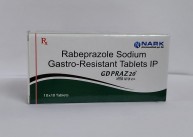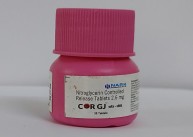Rabeprazole 20 mg tablets/IV
Medical uses
It inhibits the H+ K+ ATP phase of the coating of gastric cells and dose-dependent oppresses basal and stimulated gastric acid secretions. It also prevents gastrointestinal bleeds with NSAIDs. This medication is a proton pump inhibitor, prescribed for duodenal ulcer, gastroesophageal reflux disease (GERD), and Zollinger-Ellison (gastric acid hypersecretion) syndrome. It works by decreasing the amount of acid made in the stomach.
Mechanism of action
Rabeprazole’s mechanism of action first involves the inactive rabeprazole getting absorbed into the parietal cells of the stomach, which are the cells that are responsible for secreting hydrochloric acid (HCl). However, rabeprazole is then secreted into space from which acid secretion occurs. Here, acid secretion is mediated by the energy-dependent acid pumps, called hydrogen potassium adenosine triphosphatase (H+/K+ ATPase) pumps. These enzymatic pumps have cysteine amino acid residues. After being activated by gastric (stomach) acid to a reactive sulfenamide intermediate, rabeprazole permanently binds the cysteine residues, forming covalent, disulfide bonds. This action fundamentally alters the configuration of the acid pump, thereby inhibiting its activity. Thus, acid can no longer be secreted into the gastric lumen, and the pH of the stomach increases (decrease in the concentration of hydrogen ions, H+). Due to the permanent inhibition of the individual proton pump that each molecule of rabeprazole has bound to, acid secretion is effectively suppressed until new proton pumps are produced by the parietal cells.






